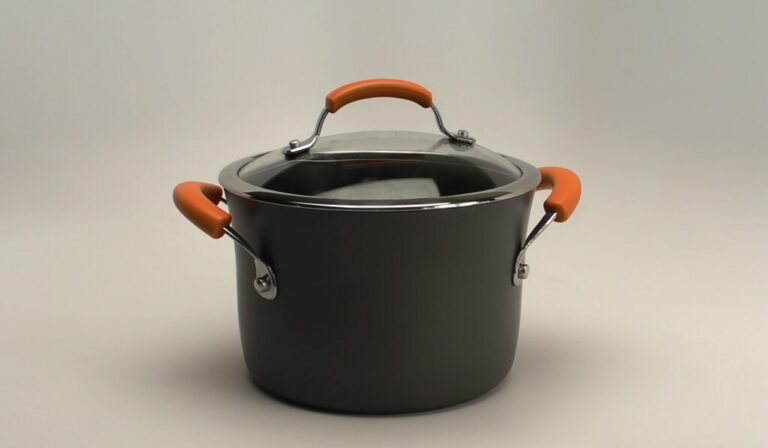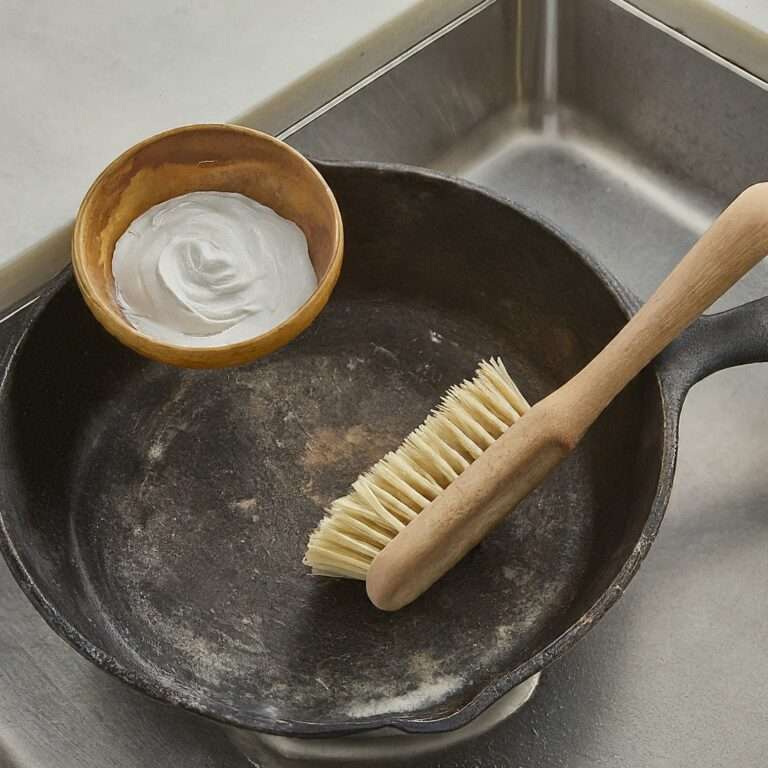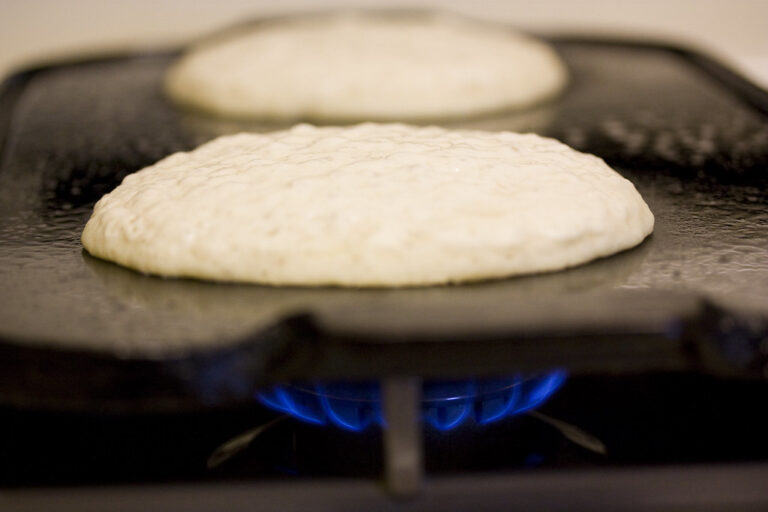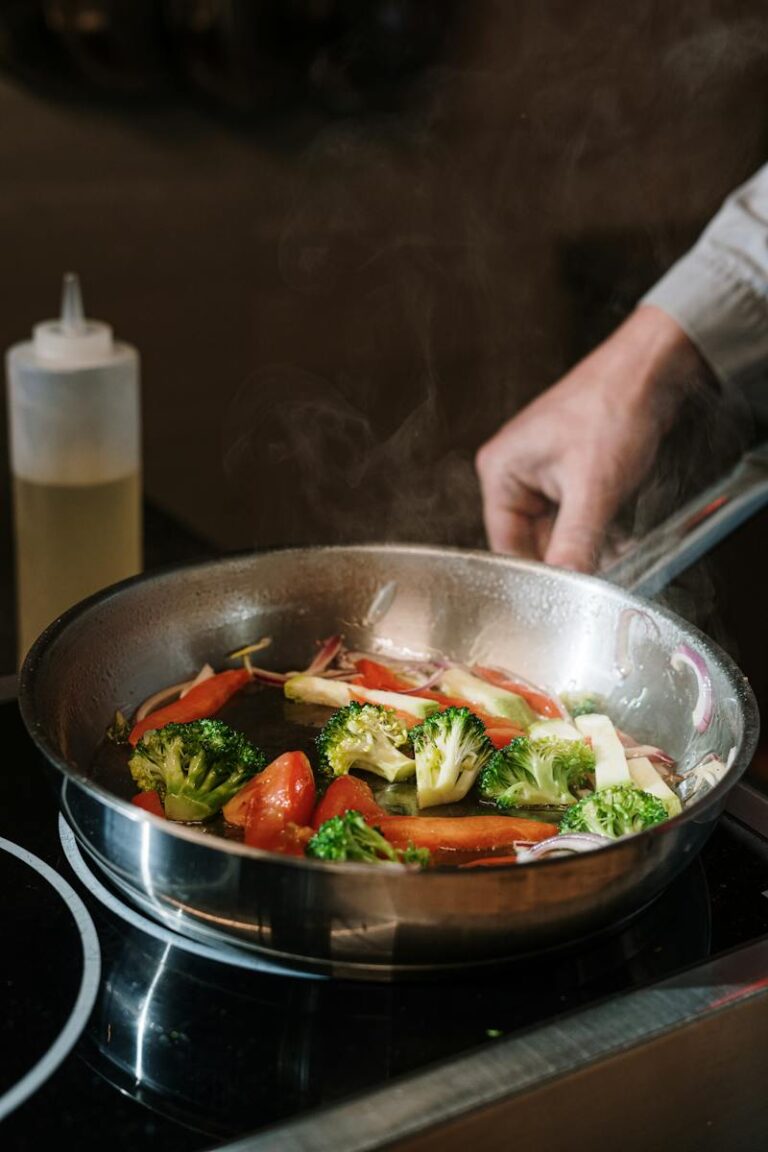I’ve always loved cooking with my trusty cast iron pan, but one thing that’s always been a challenge is cleaning off stuck-on egg residue.
Luckily, I’ve discovered some tried and true techniques for getting my pan sparkling clean again.
In this article, I’ll share the best way to season your cast iron pan, effective scrubbing methods for removing stubborn egg stains, and even natural cleaning agents you can use.
Say goodbye to sticky eggs on your cast iron pan!
Key Takeaways
- Proper seasoning with oil or fat helps create a non-stick layer
- Using enough oil or butter while cooking can prevent sticking
- Gentle abrasives like salt or baking soda can remove stuck-on egg residue
- Soap is generally not recommended for cleaning cast iron pans
Why Cast Iron Pans Are Prone to Sticking Eggs
If you’re wondering why cast iron pans tend to stick eggs, it’s because of their rough surface and lack of non-stick coating. Cast iron pans have been used for centuries due to their durability and heat retention properties. However, when it comes to cooking delicate foods like eggs, they can be a bit tricky.
The rough surface of the pan creates friction between the egg and the pan, leading to sticking issues. To prevent sticking, there are a few things you can do. First, make sure your pan is well-seasoned with oil or fat before cooking. This helps create a natural non-stick layer on the surface.
Additionally, preheating your pan properly can also help reduce sticking by creating a barrier between the egg and the pan’s surface. Troubleshooting issues such as using enough oil or butter while cooking can also make a difference in preventing eggs from sticking to your cast iron pan.
The Best Way to Season Your Cast Iron Pan
To achieve the best seasoning for your cast iron pan, you should start by properly preheating it. This step is crucial as it helps open up the pores of the metal, allowing the oil to penetrate and create a non-stick surface.
When it comes to choosing the best oil seasoning, I highly recommend using oils with high smoke points such as vegetable oil, canola oil, or flaxseed oil. These oils are able to withstand higher temperatures without breaking down or becoming sticky.
The benefits of cast iron cooking go beyond just seasoning. Cast iron pans distribute heat evenly and retain it well, making them ideal for searing meats and achieving that perfect crust. Additionally, cooking in cast iron adds a small amount of dietary iron to your food, which can be beneficial for those who struggle with iron deficiency.
Scrubbing Techniques to Remove Stuck-on Egg Residue
When scrubbing away stuck-on egg residue, you’ll want to use a gentle abrasive like salt or baking soda to avoid damaging the surface of your pan. These natural cleaning agents are effective in removing stubborn food particles without causing any harm.
I’ve found that sprinkling some salt onto the affected area and using a damp cloth or sponge works wonders in loosening the residue. The granules of salt act as tiny scrubbers, gently lifting off the sticky bits without scratching the pan’s surface.
Baking soda can also be used by making a paste with water and applying it to the residue. This method not only helps in removing the stuck-on eggs but also prevents sticking in future cooking sessions.
Using Natural Cleaning Agents for Stubborn Egg Stains
You can effortlessly remove stubborn egg stains by using natural cleaning agents like salt or baking soda.
When it comes to cleaning my cast iron pan, I prefer using natural options rather than harsh chemicals. One of my go-to natural cleaners is vinegar. Its acidity helps break down the egg residue without damaging the pan’s surface. To use vinegar, simply pour a small amount onto the stained area and let it sit for a few minutes. Then, scrub gently with a sponge or brush and rinse thoroughly.
Another effective option is baking soda. It acts as a gentle abrasive that can lift away stubborn stains. Just sprinkle some baking soda on the stain, add water to create a paste, and scrub away with a sponge or brush.
Natural cleaning options like vinegar and baking soda not only get rid of those pesky egg stains but also help maintain the integrity of your cast iron pan.
How to Properly Dry and Store Your Cast Iron Pan
Properly drying and storing your cast iron pan is essential to prevent rust and maintain its longevity.
After washing my cast iron pan, I make sure to dry it thoroughly using various techniques. Firstly, I use a clean cloth or paper towel to remove any excess moisture from the surface. Then, I place the pan on a low heat burner for a few minutes to evaporate any remaining water.
Once completely dry, I apply a thin layer of oil to the pan’s surface to create a protective barrier against moisture.
As for proper storage, I always make sure my cast iron pan is completely cooled down before placing it in a dry cupboard or drawer. Additionally, I like to stack some paper towels between my pans to absorb any potential moisture and prevent them from scratching each other.
Following these drying techniques and proper storage methods will help ensure that your cast iron pan remains rust-free and ready for future cooking adventures.
Tips for Preventing Eggs From Sticking to Your Cast Iron Pan
To prevent eggs from sticking, it’s important to properly preheat your cast iron pan. When it comes to cooking techniques, I’ve found that heating the pan gradually over medium-low heat works best. This allows the heat to distribute evenly and prevents hot spots that can cause the eggs to stick.
Before adding any oil or butter, make sure the pan is hot enough by sprinkling a few drops of water on its surface – if they sizzle and evaporate quickly, it’s ready. Additionally, using a non-stick spray or a small amount of oil or butter before adding the eggs can further help in preventing sticking.
Lastly, remember not to overcrowd the pan – too many eggs at once can cause them to release moisture and stick together. By following these simple steps, you’ll be able to enjoy perfectly cooked eggs without any sticky mess!
Common Mistakes to Avoid When Cleaning Eggs off Cast Iron
When cleaning, make sure not to use abrasive scrubbers or harsh chemicals that can damage the surface of your cast iron. Cleaning eggs off a cast iron pan requires some care and attention to avoid making common mistakes. Here are three things to keep in mind:
- Avoid soaking: While it may be tempting to let the pan soak in hot soapy water after cooking eggs, this can actually lead to rusting. Instead, clean the pan immediately after use with a non-abrasive sponge or brush.
- Use gentle cleaners: Harsh chemicals can strip away the seasoning on your cast iron pan, which helps prevent sticking. Stick to mild dish soap and warm water for regular cleaning.
- Don’t scrub too hard: While it’s important to remove any stuck-on egg residue, excessive scrubbing with abrasive materials can scratch and damage the surface of your cast iron. Be gentle but thorough when cleaning off any remaining bits of egg.
Is It Safe to Use Soap on a Cast Iron Pan
After learning about the common mistakes to avoid when cleaning eggs off a cast iron pan, you might be wondering if it’s safe to use soap on this type of cookware.
Well, let me tell you that using soap on a cast iron pan is generally not recommended. Soap can strip away the seasoning that gives the pan its non-stick properties and can also leave behind a soapy residue.
However, there are alternative ways to clean your cast iron pan effectively without using soap. For instance, you can use salt or baking soda as gentle abrasives to remove any stuck-on food particles. Another option is to use hot water and a stiff brush or sponge to scrub away any stubborn residue.
Restoring the Non-Stick Surface of Your Cast Iron Pan
When it comes to maintaining the non-stick surface of my cast iron pan, I have found that seasoning it properly is key. By applying a thin layer of oil and then heating it, I can create a natural non-stick coating that lasts for months.
In terms of cleaning, I have discovered effective methods such as using salt to scrub away any food residue and avoiding harsh detergents that can strip away the seasoning.
Overall, with regular maintenance and care, I have been able to maintain the non-stick properties of my cast iron pan for years.
Seasoning for Non-Stick
To maintain a non-stick surface on my cast iron pan, it’s important for me to regularly season it with oil. This natural seasoning process helps create a protective layer that prevents food from sticking to the pan. Here are three key things I do when seasoning my cast iron pan:
- Preheat the oven: I start by preheating my oven to around 400°F (200°C). This ensures that the oil will be evenly distributed and properly absorbed by the pan.
- Apply a thin coat of oil: Using a paper towel or brush, I apply a thin layer of high smoke point oil, such as vegetable or canola oil, all over the inside and outside of the pan.
- Bake in the oven: I place the oiled pan upside down on a baking sheet lined with foil or parchment paper to catch any drips. Then, I bake it in the preheated oven for about an hour, allowing the oil to polymerize and form a smooth non-stick surface.
Effective Cleaning Methods
One effective method for maintaining the non-stick surface on your cast iron pan is by using a gentle scrub brush or sponge to remove any food particles. It’s important to clean your pan as soon as possible after each use, as this will make it easier to remove any stuck-on food and prevent it from becoming a tough stain. Quick cleaning hacks can come in handy when you’re short on time or don’t want to spend too much effort on cleaning. For tougher stains, you can try using a paste made of baking soda and water. Apply the paste to the stained area, let it sit for a few minutes, then gently scrub with a brush or sponge. This should help lift and remove the stubborn stains without damaging the non-stick surface of your cast iron pan.
| Quick Cleaning Hacks | Removing Tough Stains |
|---|---|
| Baking soda paste | Gentle scrubbing |
| Vinegar solution | Salt and lemon juice |
| Boiling water soak | Cast iron cleaner |
Maintaining Cast Iron
After learning effective cleaning methods for my cast iron pan, I realized that maintaining it properly is equally important. Here are a few benefits of using cast iron pans and how to maintain them:
- Excellent heat retention: Cast iron pans distribute heat evenly, resulting in perfectly cooked food.
- Versatility: These pans can be used on stovetops, ovens, and even over campfires, making them ideal for various cooking techniques.
- Natural non-stick surface: With regular use and proper seasoning, a cast iron pan develops a naturally non-stick surface that improves over time.
To maintain my cast iron pan, I make sure to:
- Avoid using soap when cleaning to preserve the seasoned layer.
- Dry it thoroughly after washing to prevent rusting.
- Occasionally re-season the pan by applying a thin layer of oil and heating it in the oven.
Alternative Methods for Cleaning Eggs off Your Cast Iron Pan
You can try using a mixture of vinegar and water to clean eggs off your cast iron pan. However, if you’re looking for egg-free recipes or cleaning tips for other types of cookware, I’ve got you covered.
When it comes to egg-free recipes, there are plenty of delicious options available. From vegetable stir-fries to plant-based burgers, the possibilities are endless.
As for cleaning tips for other types of cookware, it’s important to consider the material they are made from. For non-stick pans, avoid using metal utensils as they can scratch the surface. Instead, opt for silicone or wooden utensils.
For stainless steel pans, soaking them in warm soapy water before scrubbing with a non-abrasive sponge will do the trick.
Conclusion
In conclusion, cleaning eggs off a cast iron pan can be a bit challenging but with the right techniques and tools, it’s definitely possible.
By properly seasoning your pan, using effective scrubbing techniques, and incorporating natural cleaning agents when needed, you can remove stubborn egg stains and restore the non-stick surface of your pan.
Remember to avoid common mistakes and always dry and store your cast iron pan properly to maintain its quality.



